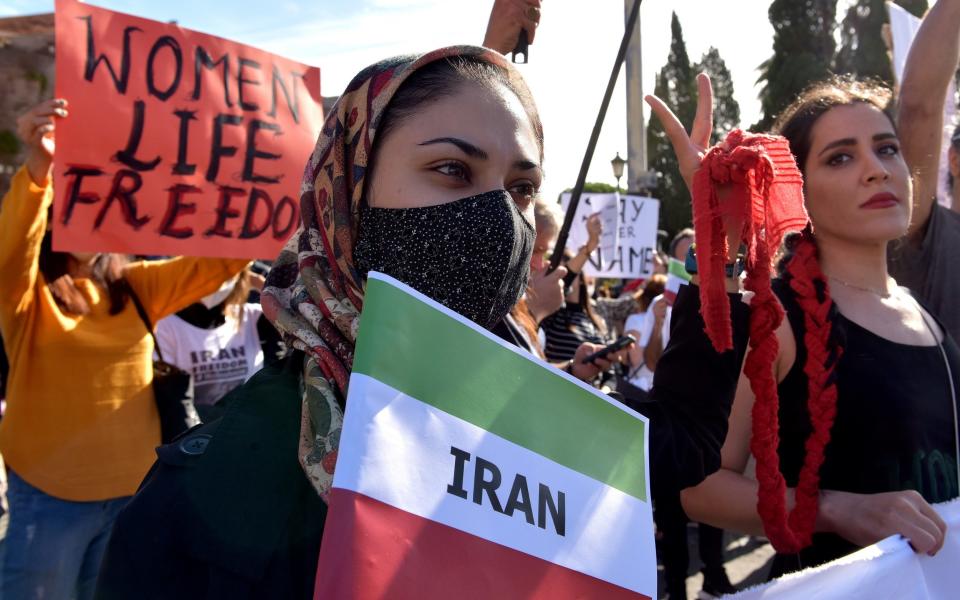Iranian women who resist wearing the hijab are to be given treatment at a specialist mental health clinic in Tehran.
The centre, called the Clinic for Quitting Hijab Removal, is the Islamic Republic’s latest attempt to quash female dissent that has swept the country since the “Woman, Life, Freedom” uprising in 2022.
Mehri Talebi Darestani, who will run the centre, said it “will be for the scientific and psychological treatment of removing the hijab, specifically for the teenage generation, young adults, and women seeking social and Islamic identity”.
Advertisement
Advertisement
She said the project is focused on promoting “dignity, modesty, chastity, and hijab” and claimed that attendance would be “optional”.

The ‘Woman, Life, Freedom’ movement inspired protests across the world, including by Iranian students in Rome – Simona Granati/Corbis via Getty Images

A protest in support of Iranian women in Brussels in 2022 – Valeria Mongelli/AFP via Getty Images
The clinic will be overseen by Iran’s Headquarters for Enjoining the Good and Forbidding the Evil, the government body responsible for enforcing strict religious standards across society.
The department is under sanctions by the UK and other countries for human rights abuses and its brutal sanctioning of women who do not adhere to Iran’s Islamic dress codes.
It is led by Mohammed Saleh Hashemi Golpayegani, who was directly appointed by supreme leader Ayatollah Ali Khamenei.
Advertisement
Advertisement
Earlier this month, a university student from the Islamic Azad University in Tehran stripped to her underwear to protest against the demands that women wear the hijab. She was branded mentally ill and taken to a psychiatric facility.

Ahou Daryaei, a 30-year-old student, walked through her Tehran university campus in her underwear to protest against the hijab. She was arrested and sent to a psychiatric hospital – Microseb/Starface/Avalon
The anti-hijab movement gained pace after the death of Mahsa Amini in morality police custody in Tehran in 2022. The 22-year-old had been arrested for not wearing her hijab properly.
Tehran has since continued to suppress women with measures including increased covert surveillance, a stronger morality police presence, and bans on unveiled women entering public spaces such as malls and parks.
The UN has labelled the crackdown “gender apartheid”.
Advertisement
Advertisement
In the wake of the 2022 protests, celebrities who posted images of themselves without a hijab were issued with court-ordered mandates to have weekly visits to psychiatric centres.
Actresses such as Afsaneh Bayegan, Azadeh Samadi, and Leila Bolukat were forced to present mental health certificates. Other punishments included bank freezes and travel bans.
Systemic oppression of women
Last year, four Iranian psychiatric associations issued a joint statement condemning the government’s systemic branding of women who do not wear the hijab as mentally ill.
“The diagnosis of mental disorders is within the competence of a psychiatrist, not a judge, just as the diagnosis of other diseases is in the competence of doctors, not judges,” the psychiatrists wrote in a letter to Gholamhossein Mohseni Ejei, the chief justice of Iran, that was published by Iranian media in July.
Advertisement
Advertisement
In March, Amnesty International, the human rights group, slammed the Iranian government for its systemic oppression of women through its hijab laws.
“In a sinister attempt to wear down resistance to compulsory veiling in the wake of the ‘Woman Life Freedom’ uprising, Iran’s authorities are terrorising women and girls by subjecting them to constant surveillance and policing, disrupting their daily lives and causing them immense mental distress,” Diana Eltahawy, Amnesty’s Middle East and North Africa director said.
“Their draconian tactics span from stopping women drivers on the road and carrying out mass confiscation of their vehicles to imposing inhumane flogging and prison sentences.”
EMEA Tribune is not involved in this news article, it is taken from our partners and or from the News Agencies. Copyright and Credit go to the News Agencies, email news@emeatribune.com Follow our WhatsApp verified Channel




